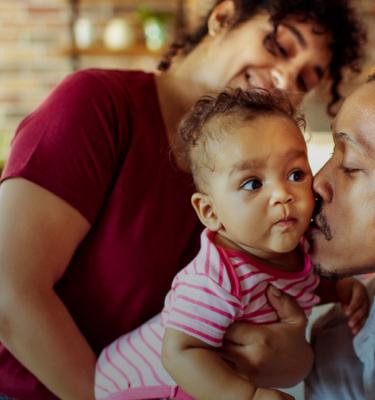About
The Supporting Healthy Relationships (SHR) program is a free family strengthening program led by psychologists that is designed to empower parenting couples to achieve family success by helping them to improve their communication skills, reduce destructive conflict, and gain financial stability.
Montefiore SHR Program.mp4 from John Borst, Grandvue Productions on Vimeo.
This program is supported by the Administration for Children and Families (ACF) of the United States (U.S.) Department of Health and Human Services (HHS) as part of a financial assistance award totaling $7.5M with 100% funded by ACF/HHS. The contents are those of the author(s) and do not necessarily represent the official view of, or an endorsement by, ACF/HHS or the U.S. Government. For more information, please visit the ACF website, Administrative and National Policy Requirements. These services are available to all eligible persons, regardless of race, gender, age, disability, or religion.
- Mission
SHR’s mission is to improve outcomes for children by providing parenting couples with a supportive, safe community where they can obtain the skills and resources to develop strong and committed relationships and overcome barriers to achieving financial health.
- Values
At SHR, we believe in an evidence-based, trauma-informed, culturally humble, and collaborative approach to supporting the families we serve.
- History
Supporting Healthy Relationships was founded in 2006, a member of the first cohort of relationship education programs funded by the OFA’s Healthy Marriage Initiative (HMI). In response to federal interest in strengthening families, OFA awarded $100 million to 125 programs focused on helping couples develop communication skills to promote more stable relationships. Since then, SHR has been awarded HMI funding through 4 grant cycles: 2006-2011, 2011-2015, 2015-2020, and 2020-2025, and has served more than 4,000 couples in the Bronx and across New York City.
Program Services
SHR is voluntary, preventative, and educational, not interventional or psychotherapeutic. Relationship and parenting education, couples employment services, and case management are the three pillars of our program. Relationship education is a wellness program, like going to the gym to get or stay in shape, as opposed to physical therapy to rehabilitate an injured body part.
Work and parenting are crucial to relationship stability since these core roles build self-esteem and establish a sense of responsibility and teamwork. Integrating relationship and parenting education with employment services, case management, and supportive service referrals helps couples cope with myriad stressors and become more stable and self-sufficient.
SHR’s Unique Approach to Relationship Education
SHR’s unique approach to relationship education has been developed and curated over the past decade and a half by psychologists and researchers at Montefiore’s Department of Psychiatry and Behavioral Sciences. SHR is one of the only federally funded relationship education programs housed within an academic institution and whose workshops are led by psychologists.
Clinically Trained Workshop Facilitators
Most relationship education workshops are facilitated by individuals who are not clinically trained based on the rationale that the leaders are required to strictly adhere to formal, structured curricula. However, at SHR, we emphasize the use of clinically trained professionals as workshop leaders, as not only are they able to troubleshoot and identify couples in need of referrals for more intensive psychological services, but they are also qualified to deviate from or elaborate on workshop content based on issues that emerge during the workshops. In addition, they are better able to competently assess and manage the inevitable distress and intense affect that often emerge within the context of couples’ interactions.
For more on the role of clinicians as workshops leaders, click here.
Evidence-Based, Curated Curriculum
SHR’s curriculum is a carefully curated blend of several evidence-based relationship education curricula: Gottman’s Bringing Baby Home, Stanley & Markman’s PREP 8.0, and Johnson’s Hold Me Tight. It has been further enhanced by psychological principles grounded in attachment theory and emotional intelligence. It has also been adapted to meet the needs of our diverse Bronx couples, with a particular emphasis on group discussions stimulated by role plays and video clips of couple interactions featuring BIPOC couples.
SHR’s Unique Experiential Approach
The SHR approach considers a healthy relationship to be comprised of secure attachment, emotional intelligence, vulnerability, and communication skills. These elements are essential, fluid, and overlapping, and are taught via four mechanisms: modeling, teaching-demonstrating, practicing-coaching, and processing. Workshops are taught by two facilitators to provide ample opportunity for modeling. The facilitators not only teach the four elements of healthy relationships, but also demonstrate through role-plays. No workshop is complete without ensuring that every couple can practice newly learned skills, and success is ensured through coaching by workshop facilitators. Finally, obstacles to at-home application are addressed by processing any new skills used or new experiences that occurred during the workshop.
Do Relationship Education Programs Work?
Over the past few decades, a significant body of research has accumulated on the effectiveness of relationship education programs. Scholars agree that relationship education helps to stabilize marriages among middle-class couples but have tended to disagree on whether relationship education is an effective poverty-fighting solution. Recent meta-analyses of ACF-funded relationship education programs have found modest but significant effects for couple relationship quality, relationship skills, mental health, and co-parenting.
A closer look at the results of many of these studies, however, shows that many of the participants included in the analyses did not attend relationship education workshops. Those who did attend the workshops did show more significant gains in their relationships. When couples are sufficiently motivated to attend relationship education workshops, they can learn conflict management skills, which in turn can improve the quality of their relationships.
For more on how government-funded relationship education can work, click here.
Supporting Healthy Marriage (SHM)
The Supporting Healthy Marriage (SHM, 2014) evaluation examined the impact of the same kind of relationship education on 6,300 low-income married couples in eight urban settings. Montefiore’s Supporting Healthy Relationships (then Supporting Healthy Marriage) was one of the eight sites included in the study. In this study, 83% of the couples actually attended at least one workshop, and the majority of couples completed the full cycle of workshops. There was a modest impact on relationship quality, relationship satisfaction, reduction in conflict, and positive communication after one year across numerous measures. There was also an impact on women’s sadness and frequency of psychological abuse. Had the study authors limited their analyses to only those couples that received more than twenty hours of marriage education, the impacts on the relationship measures would have been moderate rather than modest.
For more information on the SHM evaluation click here.
Parents and Children Together (PACT)
Supporting Healthy Relationships was also one of two sites to participate in the Parents and Children Together (PACT, 2018) evaluation, which examined the impact of relationship education on numerous variables. SHR recruited 2/3 of the couples for this study, which found clear positive impacts commitment, marital stability, co-parenting, and reduction in destructive conflict. There was also another very important finding present only at the Montefiore site: SHR achieved a very significant impact on employment and earnings as well as on the relationship quality variables. While many prior studies had demonstrated the impact of relationship education programs on improvements in relationship quality, the PACT study was the first to demonstrate impacts on marital stability, employment, and earnings.
For more information on the PACT evaluation click here.
SHR 2015-2020 Program Evaluation
During its third round of federal funding, Montefiore’s Supporting Healthy Relationships conducted a local evaluation that examined what factors account for impacts of relationship education at 6- month follow-up. The study included 1,042 participants and found improvements in relationship satisfaction and reductions in relationship distress. The evaluation also measured changes in emotional intelligence and relationship knowledge and skills, and notably found a significant impact on improvements in emotional intelligence and knowledge and skills. In other words, after attending SHR, not only are couples happier in their relationships, but they are also actually more emotionally intelligent and more skillful and knowledgeable about how to communicate.
SHR 2020-2025 Program Evaluation (Current Research Study)
During the current, and fourth funding cycle, SHR is conducting a local evaluation that addresses a research question about the impact of different ways of implementing relationship education curricula: Does the delivery of group relationship education workshops virtually (i.e., via Zoom) impact engagement, skills learning, and relationship quality outcomes in comparison to in-person group workshops? In order to answer this question, SHR is implementing a randomized control trial where couples are randomly assigned to Zoom or In-Person workshops. Couples complete data collection at intake, program completion, and 6 months following intake.

